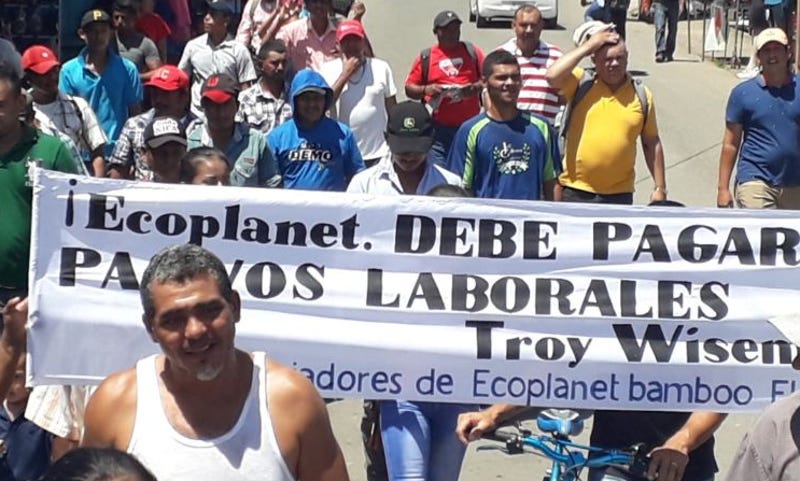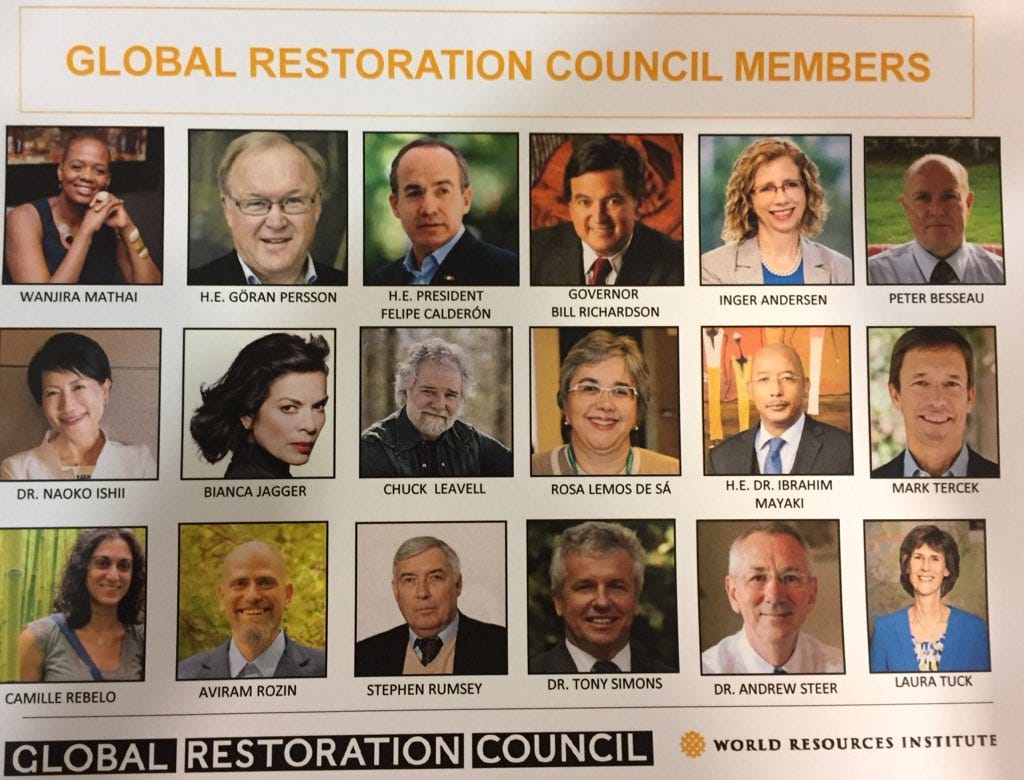How EcoPlanet Bamboo duped World Resources Institute and The Nature Conservancy
A recent article by Angeli Mehta on the website Ethical Corporation reports on a “young company” called EcoPlanet Bamboo. Mehta writes that “EcoPlanet Bamboo is creating permanent jobs for communities.”
Camille Rebelo, co-founder of EcoPlanet Bamboo, told Mehta that,
“These are multi-generational projects … In Nicaragua that [means it is creating jobs for] 90-120 years if managed correctly.
Bamboo needs a lot of management in the first five to six years so employment is high on the field level … then onto manufacturing.”
Mehta’s reporting was based on a January 2018 report published by the World Resources Institute and The Nature Conservancy.
The report is titled, “The Business of Planting Trees: A Growing Investment Opportunity”, and was written by Sofia Faruqi (WRI), Andrew Wu (WRI), Eriks Brolis (TNC), Andrés Anchondo Ortega (ex-WRI), and Alan Batista (TNC).
In the report, WRI and TNC’s authors state that,
The company emphasizes community impact, seeking to provide job opportunities for local communities and employing and training several hundred workers.
Workers protest in El Rama, Nicaragua
All this must come as a surprise to EcoPlanet Bamboo workers in Nicaragua.
Three days after Mehta’s article, the Nicaraguan newspaper La Prensa put out a report about 86 workers marching in the streets of El Rama in Nicaragua, demanding that EcoPlanet Bamboo pay their salaries.
Adrián Meza, a lawyer from the Centre for Labour Studies at Paulo Freire University, is representing the workers. He says that EcoPlanet Bamboo owes the workers a total of about US$400,000.
One of the workers, Elvin García told La Prensa that the problems started in April 2017. The company said they had a budget cut “because of an embargo”. As a result payments were delayed.
La Prensa reports that the workers will file a legal case against the company in the week after Easter.
Earlier this week, an investor in EcoPlanet Bamboo told REDD-Monitor that,
The Nicaraguan plantations have now been abandoned and several thousand acres of bamboo are fast returning to jungle. The workers have been laid off without pay and the local economy is in tatters.
Last year, REDD-Monitor was informed that EcoPlanet Bamboo’s operations in Ghana had been closed down because EcoPlanet Bamboo “owed too many people money”. REDD-Monitor has heard from another ex-employee of EcoPlanet Bamboo who is also owed money.
Sustainable on paper?
On paper at least, EcoPlanet Bamboo’s plantations in Nicaragua may (at first glance) have appeared sustainable:
In 2012, Rainforest Alliance certified that the plantations were well managed under the Forest Stewardship Council system.
In 2012, Rainforest Alliance also validated the plantations under the Verified Carbon Standard and under the Climate, Community, and Biodiversity Standard.
In 2013, EcoPlanet Bamboo received a guarantee from the World Bank’s Multilateral Investment Guarantee Agency on US$27 million of equity investment for 15 years against political risk, including expropriation and war and civil disturbance. In 2015, MIGA increased its guarantee to US$48.8 million.
In 2014, Rainforest Alliance verified the company’s Nicaragua plantations under the Verified Carbon Standard.
In 2014, the U.S. Department of State awarded EcoPlanet Bamboo its Award for Corporate Excellence in the small and medium enterprises category for its work in Nicaragua.
EcoPlanet Bamboo’s investment scam
From 2011, EcoPlanet Bamboo was busy raising money by selling “bamboo bonds” to retail investors in the UK and elsewhere. The companies marketing the bonds, including Property Frontiers, EcoInvestments, and Emerald Knight, promised returns of 500% (and more) over a 15 year investment period.
In a series of posts, REDD-Monitor has documented how the investments in EcoPlanet Bamboo went pear shaped.
The company set up a complex web of companies registered in tax havens such as Delaware and the Isle of Man. Two of the Isle of Man registered companies subsequently went into liquidation: Premier Group and Eco Resources Fund.
In March 2017, the Isle of Man Financial Services Authority put out a document of “Frequently Asked Questions” about the Eco Resources Fund. One of the questions was for investors: “Will I get any of my money back?”
The answer was as follows:
The financial distress of the underlying companies and the apparent foreclosure by SAL [Sustainable Asset Lending], does however mean that substantial recovery of value from the plantations may be unlikely.
EcoPlanet Bamboo’s virtual reality
None of the company’s financial difficulties are even hinted at on EcoPlanet Bamboo’s website.
Of course, there’s no mention that the plantations in Nicaragua are no longer FSC certified. In fact, the certificate lapsed in November 2017 and was not renewed.
Neither is there any mention of unpaid workers in Nicaragua.
Instead there is a stream of good news stories giving the impression of a successful and expanding company.
Meanwhile, Troy Wiseman remains on the board of directors of the Earth Day Network.
In February 2018, Camille Rebelo was at the UN Food and Agriculture Organisation taking part in a meeting of the Collaborative Partnership on Forests. Needless to say, her presentation makes no mention of the company’s financial woes.
Rebelo is a member of WRI’s Global Restoration Council. This prestigious group also includes Mark Tercek and Andrew Steer, CEOs of The Nature Conservancy and World Resources Institute respectively.
Perhaps this helps explain why the report by WRI and TNC is so uncritical of EcoPlanet Bamboo’s operations. But it does not excuse WRI and TNC’s failure to uncover the reality of EcoPlanet Bamboo’s shuttered operations, unpaid workers, and an unravelling investment scam.







